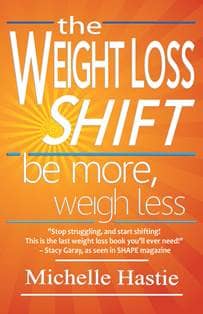Your Emotions Are Here to Teach You Lessons, Not Make You Fat
We’ve all blamed our weight gain on emotional eating. The truth, however, is that emotional eating is not the exclusive domain of the overweight. It’s universal.
We all eat foods for emotional reasons. We reach for one food because it reminds us of our childhoods, for another because it makes us feel safe or secure. We stock up on our favorite feel-good foods when we’re sick or trying to mend a broken heart. We eat when we’re sad and when we’re happy and in celebration.
If emotional eating is such a normal part of our lives, the question becomes: Why do some people gain weight when they do it while others don’t?
The difference is not in what or when we eat. It’s in how we eat, and how we deal with the underlying emotions causing us to eat.
Both thin and overweight people may use a pint of ice cream to deal with a break up, but they do so very differently. While overweight people may dig into the ice cream when they’re already full, thin people will wait until they are hungry to eat it. Then, unlike overweight people who often rush through the treat, berating themselves for their lack of willpower, thin people will be present with the food as they eat, taking their time with it and savoring each feel-good bite. Finally, when it’s done, it’s done, no follow-up serving of guilt or judgment.
When we eat out of emotional hunger without any physical hunger, we introduce negativity into the experience from the very beginning. Right away, we acknowledge that we are ignoring our body, which we don’t like, and then we proceed to make ourselves physically uncomfortable. Our discomfort causes us to withdraw from the eating experience, making it largely unconscious. When we do this, we also withdraw from our emotions. Then, because we haven’t been present, we do not get the feel-good experience we were expecting, and we look for more. Suddenly, the pint of ice cream turns into a pint-and-a-half of ice cream, plus a bag of chips, and ten cookies.
Once we snap out of our emotional binge, we feel overly full, guilty, and judgmental of ourselves. In the end, we feel worse than we did when we started. Instead of feeling like we’ve taken care of ourselves, we feel betrayed. Instead of loved, we feel pained. And, we are still left to deal with the emotion that caused us to want the ice cream in the first place, which means the entire process inevitably will repeat itself, unless we figure out how to break the cycle. Learning how to effectively handle painful emotions is one way to do this.
Oftentimes when we feel anger, sadness, guilt, fear, doubt, or any other emotion we don’t enjoy feeling, our first inclination is to stop feeling it immediately. This inclination, however, often backfires, because it violates two important emotional truths:
1. Allowing ourselves to feel our unenjoyable emotions drastically reduces their intensity.
2. The less we resist unenjoyable emotions, the faster they subside and we can move on.
By attempting to flee from our emotions, we are only postponing the inevitable moment when we will be required to deal with them. We would be better served if we took the time to understand them.
Whatever unenjoyable emotion you may be feeling, consider why you are feeling it. If it is an emotion you continue to feel over and over, like fear, consider what lessons the emotion may have to teach you.
If you can identify what you are meant to learn from fear, you won’t need to feel it so often. If you know why you have doubt, your body won’t need to keep sending you the message. Remember: The subconscious mind communicates to us through pictures, sounds, and feelings. Your conscious mind’s job is to figure out those communications and learn from them.
When you feel like eating and you know you are not physically hungry, ask yourself what you really need in that moment. Be open and honor your body and mind and what it requires of you. Once you learn to face your emotions head-on, you’ll stop covering them up with food, and the binges will stop.
To read more of “The Weight Loss Shift: Be More, Weigh Less” by Michelle Hastie, visit Amazon, B&N, or the Absolute Love Publishing store.
Michelle Hastie is the author of “The Weight Loss Shift: Be More, Weigh Less” and a contributor to the women’s studies bestseller, “Women Will Save the World.” A weight loss coach, Michelle helps chronic dieters surrender to their body wisdom in order to lose weight permanently. Using a blend of science, psychology, and spirituality, Michelle helps people live


